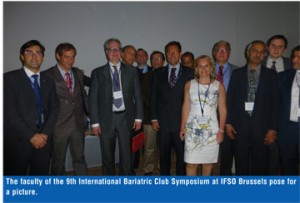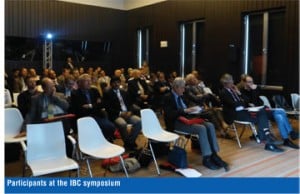9th International Bariatric Club Symposium at IFSO Brussels Brussels, Belgium • April 30, 2014
by Cynthia-Michelle Borg

Ms Cynthia-Michelle Borg is Symposium Director, Consultant Bariatric and Upper GI surgeon, Lewisham and Greenwich NHS Trust, London, United Kingdom.
Bariatric Times. 2014;11(7):20–21.
The 9th International Bariatric Club Symposium was held on April 30, 2014, at the Sqare Congress Centre in Brussels, Belgium. The symposium was part of the International Federation for the Surgery of Obesity and Metabolic Disorders (IFSO)-European Chapter conference, which took place April 30 through May 3, 2014. The session was very well attended with standing room only at times.
Dr. Luc Lemmens, IFSO European Chapter conference President, opened the meeting. The symposium began with two keynote lectures. The first lecture, presented by Dr. Ramon Vilallonga Puy, was on the current status of robotic bariatric surgery. Robotic surgery has been used for different bariatric procedures in a safe and feasible manner. The lecture concluded that while robotic bariatric surgery confers some technical advantages, studies have shown that these have not translated into an improved outcome in clinical practice when compared to standard laparoscopic surgery. Operative time, learning curve, and costs remain among the issues that need to be addressed. Exciting developments, however, may be on the way with the advent of new platforms, mini-robots, and nanotechnology.
Next, Dr. George Eid gave an overview of his experience with endoluminal options for weight regain after primary bariatric surgery. Several endoscopic devices have been developed and used to improve or restore restriction for weight regain. Dr. Eid suggested that these technologies should be used earlier rather than later in the patients’ weight regain curve. Patients’ expectations, however, need to be managed to ensure they are realistic. These technologies should be safer and easier than revisional laparoscopic surgical procedures.
Debates followed the lectures. The role of staple line reinforcement when performing sleeve gastrectomy was debated by Drs. Michel Gagner and Catalin Copaescu. Dr. Gagner pointed out that we still lack accurate knowledge regarding stomach thickness and its blood supply. He presented a recent study1 showing decreased incidence of bleeding and overall complications with the use of staple line reinforcement. A recent metanalysis also showed that the leak rate was lowest when absorbable buttress material was used (1.09%) compared to suturing (2.04%), no reinforcement (2.6%), and nonabsorbable bovine pericardium (3.3%).
Dr. Copaescu insisted that buttressing is costly, and complications in sleeve gastrectomy can be reduced by careful attention to detail like raising the blood pressure at the end of the operation to ensure adequate hemostasis. They concluded that large randomized trials are required.
Drs. Martin Fried and Antonio Torres Garcia led the debate on the future of malabsorptive bariatric surgery. They concluded that it is unlikely that these operations will become obsolete, as they are currently associated with the best outcome in terms of weight loss and resolution of metabolic conditions.
An expert panel, led by Dr. Eid, discussed the role of laparoscopic adjustable gastric banding (LAGB) in revisional surgery. Several faculty members agreed that LAGB may have a role in revisional surgery for patients who fail to achieve sufficient weight loss or who have weight regain after gastric bypass. However, they stressed that patient selection is very important. The reasons why the initial operation failed need to be investigated and taken into consideration. The size of the pouch and gastrojejunostomy should be evaluated by the bariatric surgeon with an upper GI contrast study and endoscopy. There was a difference in opinion regarding the erosion rates when bands are used in revisional cases with some experts warning strongly about the high incidence of this complication. Alternative revisional techniques, including conversion to a malabsorptive procedure and the use of endoluminal techniques were also discussed. More long-term data regarding the outcome of these revisional techniques are required.
Another topic discussed by the panel was extreme weight loss after gastric bypass. This debate was led by Mr. Evangelos Efthimiou. The discussion stressed the importance of careful reassessment of the underlying anatomy with exclusion of marginal ulcers, internal hernias, gastro-colonic fistula, or inadvertent distal bypass configurations. The panel agreed that patients with unexpected excessive weight loss require a comprehensive clinical as well as psychological work-up. They agreed that alcoholism, laxative abuse, and new pathology, such as inflammatory bowel disease and cancer, need to be excluded. Adequate nutritional status and supplementary feeding using a feeding gastrotomy tube in the bypassed stomach was recommended. In severe and persistent cases, reversal of the operation may be considered once the patient is nutritional stable.
The last expert panel discussion was on ileal interposition and its future. Dr. Surendra Ugale suggested that the amelioration of type 2 diabetes mellitus (T2DM) after ileal interposition is due to a combination of factors and the different parts of the operation have an additive effect. The panel agreed that more research is required regarding the effects, reproducibility, and long-term issues of this operation. Concerns were also raised regarding internal hernias postoperatively.
At the end of the session, Dr. Marius Nedelcu presented a case from the IBC Facebook page about a patient with weight regain after sleeve gastrectomy. Most of the panel suggested that oesophagogastroduodenoscopy (OGD) and imaging of the sleeve with computed tomography (CT) volumetry is required prior to offering revisional procedures, including re-sleeving. Patient selection is important and adherence regarding diet and psychological issues should be rectified prior to offering other bariatric procedures. Professor Verhaege shared his experience with the management of sleeve failures and the use of CT scan gastric volumetry postoperatively. If patients have a residual volume of over 400 cm3, had insufficient weight loss, or were regaining weight, resleeving could be an option. At least early in the learning curve, however, these operations can take longer to perform and have a longer in-hospital stay than primary sleeve procedures.
I would like to thank Drs. Marius Nedelcu and Ramon Vilallonga Puy (co-directors), the IBC board, and the IFSO-EC Brussels organizing committee. IBC is also very grateful to the distinguished faculty—Luc Lemmens, Sanjay Agrawal, Luigi Angrisani, Jean-Marc Chevallier, Catalin Copaescu, Bruno Dillemans, Evangelos Efthimiou, George Eid, Martin Fried, Michel Gagner, Jacques Himpens, Antonio Torres Garcia, Surendra Ugale, Pierre Verhaege, and Rudolf Weiner for their time and commitment.
Full transcripts of this symposium will be on the IBC website (www.ibcclub.org) in the very near future. The next IBC symposium will be in IFSO 2014 in Montreal, Quebec, Canada, on August 27, 2014. The provisional program can be found on the website at www.ibcclub.org/wp-content/uploads/2014/04/IBC-Montreal-August-2014-Program.pdf.
Funding: No funding was provided.
Disclosures: The author reports no conflicts of interest relevant to the content of this article.
References
1. Gagner M, Buchwald JN. Comparison of laparoscopic sleeve gastrectomy leak rates in four staple-line reinforcement options: a systematic review. Surg Obes Relat Dis. 2014 Jan 28. [Epub ahead of print]
Category: Past Articles, Symposium Synopsis







